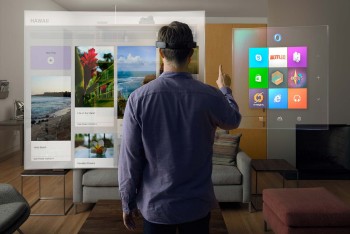
Discuss: Microsoft unveils liquid-cooled Lumias, curved fitness bands, next-gen VR and more
Microsoft had a big Windows 10 event today, though it wasn’t the software side of the platform they were focusing on. They had a lot of hardware to dazzle folks with, and dazzle some of it did. It may be Windows, but the Redmond company’s latest advancements could influence the direction of tech in a broad way. Let’s take a look at everything they showed off today!
New Fitness Band
For those who primarily use Android phones (read: most people likely to be reading this very article), a new Microsoft Band is here. It has a curved display, and a metal build. It’s lighter, sleeker, and looks better. It mostly has the same features as the original Microsoft Band, though, which includes GPS, a heart rate sensor, guided workouts and dieting plans.
This rendition adds a barometer into the mix, and also has golf swing tracking. You’ll also enjoy integration with Microsoft’s Cortana, the voice assistant that seems to be everywhere these days. It’s coming October 30th for $249.99 and should be able work with any modern Android phone.
Next-gen smartphone cooling
But there was more. A lot more. Let’s talk about these new Lumia devices, which have one very cool thing going for them: liquid cooling. That feature is present in the Lumia 950 XL, a phablet that sports a Snapdragon 810 chipset. It’s also chucked inside the smaller 5.2-inch version of that same phone, simply dubbed Lumia 950.
With all the noise made about overheating issues with that chipset liquid cooling is certainly something that stands to be more than just a cool parlour trick. It doesn’t do bad for itself in other areas either, with 32GB of expandable storage and a 20 megapixel Carl Zeiss camera.
A tablet? A laptop? Both?
Of course, a Microsoft event isn’t complete without laptops and tablets. Or laptop and tablet hybrids. There’s the Surface Pro 4, which looks nearly identical to the Surface Pro 3 save for a slightly thinner profile. It does run 30% faster than last year’s model, though, so there’s that. It’s also compatible with an improved digital stylus that has 1,024 touch levels.
But this thing is very interesting.
It’s like a Lenovo Yoga, except it has an odd-looking hinge and Microsoft’s logo stamped on it. That hinge is actually being called a “dynamic fulcrum hinge,” and its purpose is to provide consistent and fluid motion throughout the entirety of the device’s life as opposed to traditional hinges which can become creaky or loose over time. It also helps prop the Surface Book up ever-so-slightly so it seems like a clipboard, drawing pad, or notebook whenever you use it in that manner.
It can be detached from its keyboard to become a portable work tablet if you need it to be. With an i7 chipset and Windows 10, it’s basically a souped-up Surface, and perhaps that’s the exact thing Microsoft wants and needs to take on the Macbook Air.
The future of augmented and virtual reality
This is Microsoft HoloLens. If you don’t know, it’s a mix between augmented and virtual reality. Virtual objects populate the physical world around you. It can be used for advanced applications, games or multimedia.
Imagine having a Netflix movie projected to the side of your house. Or being able to cast a Minecraft world onto a table in front of you in order to get a top down view of your sandbox world. You could even craft 3D models right on your desk.
Microsoft isn’t the only one making the strides necessary to take VR from being just a “cool way to view movies” into a full-on technological marvel. HTC’s Vive is doing pretty well in the “wow” department itself, especially when stuff like this is already possible.
This is Bourne-level stuff, folks, and we’re excited to see what developers can do when they get their hands on it.
Speaking of which, Microsoft confirmed that they’ll be going with the same approach Google did for Glass by offering it in developer preview mode for a pretty hefty price tag. $3,000 is the initial asking price, which we imagine is far outside the price range of most typical consumers.
We doubt the final product will demand that much moolah at retail, though, so let’s wait until the project has matured and Microsoft has announced general availability information before letting out a collective “hell no.” As for the developers who will be fortunate (and rich) enough to use one of these in the early days, be on the lookout for sign up information soon.
Do you care?
We did say it was a lot, didn’t we? Even though Microsoft may not be launching any Android devices anytime soon, their efforts are bound to influence the companies who will. Liquid cooling smartphones. Exciting VR. Laptop/tablet hybrids. Smarter fitness bands.
They’re doing it all, it seems, but the only question that matters: do you care about any of it? What are you or are you not excited for? Are you yearning for game-changing stuff like liquid cooling to make their way into your next smartphone? Let us know with some comments straight ahead!